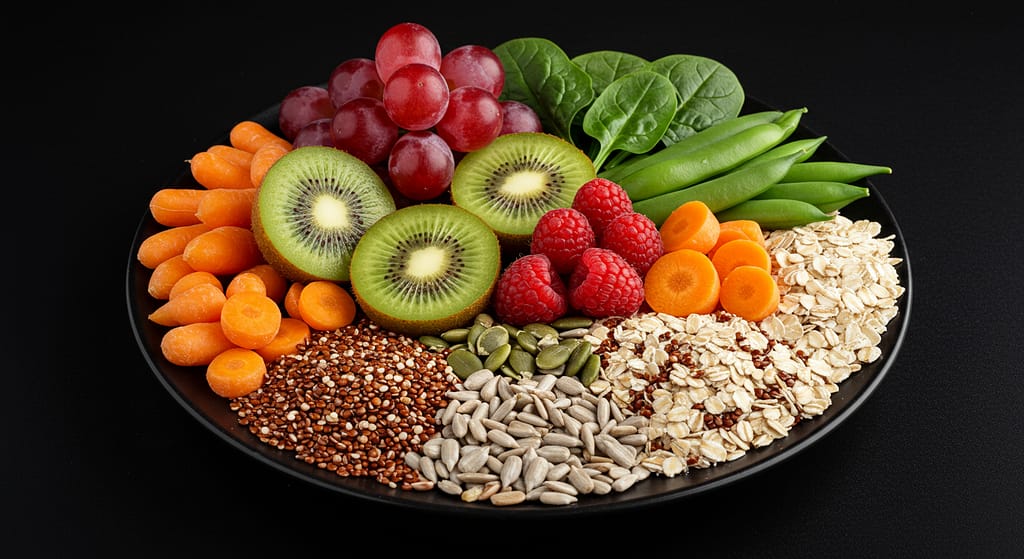Table of Contents
- Introduction: Diet and Depression
- How Food Influences Mood
- The Carbohydrate Connection
- Caffeine: Friend or Foe?
- Dangerous Habits That Worsen Depression
- Vitamins and Nutrients That Protect Your Brain
- Support for Hormonal Depression
- Conclusion: Choose Your Food Wisely
Introduction: Diet and Depression
Depression is more than just sadness—it affects your brain, body, and overall quality of life. Emerging research shows that your diet plays a crucial role in both the development and management of depression. While food alone isn’t a cure, the right nutrients can help stabilize mood, improve brain function, and support recovery.

External resource: Harvard Health – Nutrition and Depression
How Food Influences Mood
Certain foods and dietary supplements can influence brain chemistry. Tryptophan, an amino acid found in foods like turkey, eggs, and nuts, helps produce serotonin—a neurotransmitter that regulates mood. Low serotonin levels are linked to more severe depression symptoms, while proper nutrition can help restore balance.
Internal link suggestion: Connect to Symptoms of Depression for readers wanting more details on early detection.
The Carbohydrate Connection
Carbohydrates are often misunderstood, but studies show they can reduce depressive symptoms in some individuals. For example, high-carb intake has been shown to relieve premenstrual syndrome (PMS) symptoms temporarily. Carbs also help balance omega fatty acids, whose imbalance is associated with higher depression risk. Choosing whole grains, fruits, and vegetables over refined carbs provides sustained energy and mood stabilization.
Caffeine: Friend or Foe?
Caffeine’s effect on depression depends on moderation.
- Moderate intake (one cup of coffee or tea per day) may help lower depressive symptoms.
- Excessive intake can heighten anxiety, disrupt sleep, and exacerbate depression.
The key is balance. Pair caffeine with healthy habits like exercise and mindfulness to maximize benefits.
Dangerous Habits That Worsen Depression
Some lifestyle habits may temporarily relieve stress but ultimately worsen depression:
- Alcohol overconsumption
- Smoking
- Recreational drug use
These substances can drain mental health, disrupt brain chemistry, and increase irritability. Avoiding or minimizing them is essential for emotional balance.
External resource: Mayo Clinic – Depression and Lifestyle Choices
Vitamins and Nutrients That Protect Your Brain
Several vitamins and nutrients are linked to lower depression risk and improved mood:
- Vitamin B complex: Supports serotonin production
- Vitamin B3 (Niacin): Helps regulate blood flow and emotional balance
- Vitamin B12 & calcium: Supports hormonal regulation and mood stability
- Vitamin C & iodine: Essential for brain function and neurotransmitter synthesis
- Amino acids: Critical building blocks for brain chemistry
Adding these nutrients via diet or supplements can complement therapy or medications, helping prevent mood swings and supporting mental wellness.
Support for Hormonal Depression
Women may experience hormonal depression during menstrual cycles, postpartum periods, or menopause. Vitamins like B12 and calcium are particularly beneficial in regulating mood and supporting brain chemistry. A 2001 study confirmed that proper supplementation can reduce postpartum depression and enhance overall emotional resilience.
Internal link suggestion: Link to Childhood and Adolescent Depression for readers wanting age-specific insights.
Conclusion: Choose Your Food Wisely
A healthy, balanced diet is not a replacement for therapy or medication, but it is a powerful preventive tool. The foods you consume directly affect your mood, brain chemistry, and energy levels. By incorporating nutrient-rich foods, avoiding harmful habits, and staying mindful of your caffeine and carb intake, you can support your mental health from the inside out.
Take charge today—your plate can be your first step toward fighting depression naturally.
